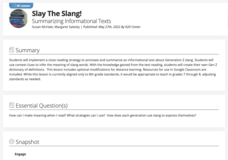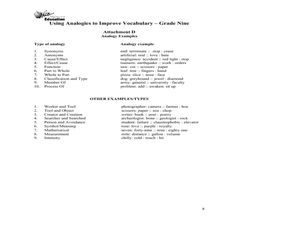Curated OER
Making Inferences While Identifying Similes and Metaphors
Use this lesson to study similes and metaphors and the inferred meaning. In this language arts lesson, 5th graders write their own similes and metaphors. A worksheet is provided for extension work or to check understanding as homework.
K20 LEARN
Between The Lines: Inferences In The Narrative Life Of Frederick Douglass Excerpt
Good literature can be much like an iceberg requiring readers to presume that the bulk of the meaning may be inferred to be found below the surface. Here's a lesson that asks scholars to conduct a close reading of passages from The...
It's About Time
Volcanic Landforms
Did you know the word volcano comes from the name of the Roman god of fire, Vulcan? During this activity, scholars make a topographic map, interpret topographic maps, and infer how lava will flow based on their analysis.
K20 LEARN
Slay the Slang! Summarizing Informational Texts
Middle schoolers get hip to the jive with a lesson about slang. They closely examine examples of slang and use context clues to infer the meaning of the terms. Groups read and summarize an article about a teacher who created a Gen Z...
Curated OER
Meaning of Philanthropy
Middle schoolers explore the concept of philanthropy. In this service learning lesson, students discover what philanthropy is and identify people who benefit from philanthropy. Middle schoolers read selected newspaper articles regarding...
Curated OER
Reading Between the Lines: Making Inferences About Idioms
Students discover idioms. In this inferencing lesson plan, students identify idioms from passages and infer meanings of unknown idioms using prior knowledge and experience. Students write sentences using newly learned idioms.
Curated OER
Rooting One's Way To Meaning
Students use a thesaurus on the internet to explore the meanings of Greek and Latin roots. They find definitions of given words, draw a concept map for root words, and write four synonyms for each word. Students discover how Latin and...
Curated OER
Using Analogies to Improve Vocabulary
Ninth graders analyze the relationships for pairs of words in analogical statements to infer word meanings. In this word meanings lesson, 9th graders complete an analogy pre-assessment, study a chart for using analogies to improve...
Curated OER
During Reading Strategies
Middle schoolers employ strategies to increase comprehension while they are reading. In this language arts lesson, students must infer, predict and visualize in order to improve comprehension.
Curated OER
Syllables: Learning to Read
In this reading/grammar worksheet, students practice reading words with more than one syllable. Next, students think of 4 more words that have at least 2 syllables. Worksheet is designed to be signed by both student and parent when...
Curriculum Corner
Inferencing
Inferencing is a necessary reading skill to uncover non-explicit messages in text. Use the set of resources as a way to guide learners toward becoming expert inferrers through reading prompts and literature with text and without text.
Curated OER
Ancient Rome
Students complete pre reading, writing, during reading, and interdisciplinary activities for the book Ancient Rome. In this reading lesson plan, students complete journal entries, go over vocabulary, answer short answer questions, have...
Curated OER
Improve Your Spelling with the Visual Thesaurus
Using Visual Thesaurus software, class members participate in a computer-based spelling bee. Then they work in groups to analyze the words and use deductive reasoning to infer spelling patterns. They then present one of their "rules" to...
Curated OER
Inference
Making inferences about what you read is an important skill for both elementary, middle, and high school learners. Focusing on events which occurred during World War II, they answer a series of questions related to what we can infer as...
Curated OER
Listening Comprehension: Answering High Level Questions
Kndergarteners work to build strong listening and reading comprehension skills by answering higher level questions. After a teacher demonstration of the task, learners listen to the story The Three Little Pigs, the teacher asks them...
Curated OER
Applying Discourse Analysis in the
Students investigate the use of discourse markers in context using a written film review. They infer meaning and correct usage of target language through context by means of inductive exercises.
Curated OER
Wrapped in Mystery
Sixth graders can identify five basic elements that most mysteries contain. They put the elements of mystery into a graphic organizer they can follow. They construct meaning after reading Poe's short story and identify or infer the...
Curated OER
Other Voices - Latino and Chicano Literature and Identity in America
Twelfth graders analyze "Dedication" and "Child of the Americas" using a double-journal format. They compare responses and infer meaning from the connotations of select images in the poems write a paragraph describing the importance of...
Hawaiʻi State Department of Education
Illustrating Text
Ideas like this are highly effective for helping build better reading comprehension. The class listens to an excerpt from a grade-appropriate text, and they discuss what clues or words helped them visualize the scene. They then read a...
Curated OER
A Discourse on the History of Language
Analyze and make inferences from the information used by linguists to construct the evolution of languages. They research different dating techniques to explain how scientists infer age with evidence.
Curated OER
Introducing the Memo
Examine the text structure of a memo with this worksheet. Eighth to twelfth graders decide if the purpose of a memo is to motivate an action or to provide information to the reader. They explore new vocabulary and make predictions prior...
Montgomery K12
Clues in Sentences Investigation
Explore the variety of context clues that help us learn new meanings of unknown words! With this presentation, pupils go in depth into each type of context clue and have their knowledge tested with several small reading passages in which...
Star Wars in the Classroom
"Shakespeare and Star Wars": Lesson Plan Day 6
How can a screenplay create meaning and drama in ways that other forms of writing cannot? That is the question class members must answer as they compare the cantina scene of the screenplay for George Lucas's Star Wars: A New Hope with...
Have Fun Teaching
Making Inferences (8)
Kids examine the clues provided by a prompt to infer what will happen next. They then illustrate the short story.

























